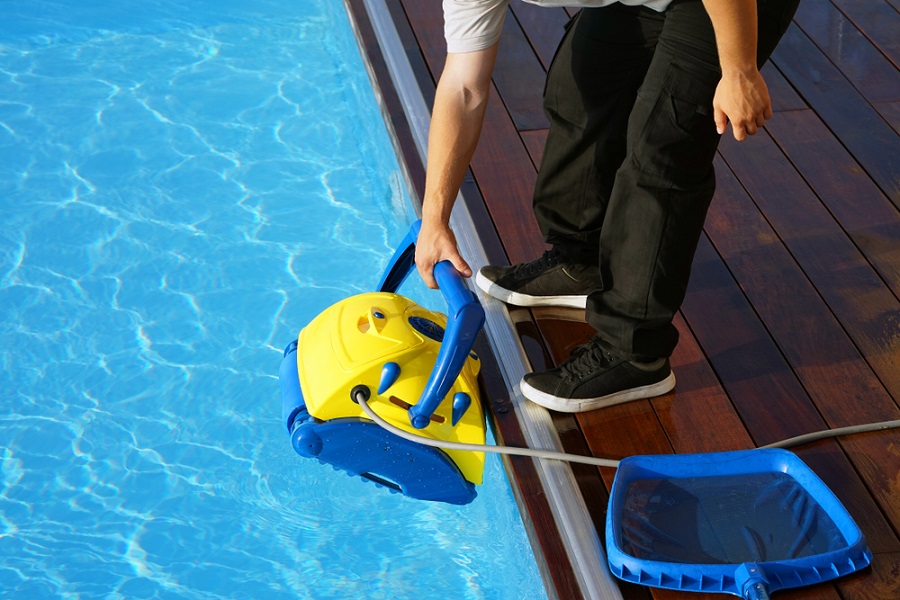Pool cleaning is one of those things that most homeowners don’t think about until they actually need to do it.
But once you’ve done it by hand, you quickly come to realize two things:
1. It’s time-consuming and boring
2. who else can I get to do this job?
Automatic pool cleaners: There are several kinds of automatic pool cleaners, but all of them address the questions above.
To help you decide what kind of cleaner you might want to purchase, we discuss the most important pros and cons of automatic pool cleaners in general, then dive into each type and compare them on their own merits.
Automatic Pool Cleaners: Pros
1. They're Easy To Use
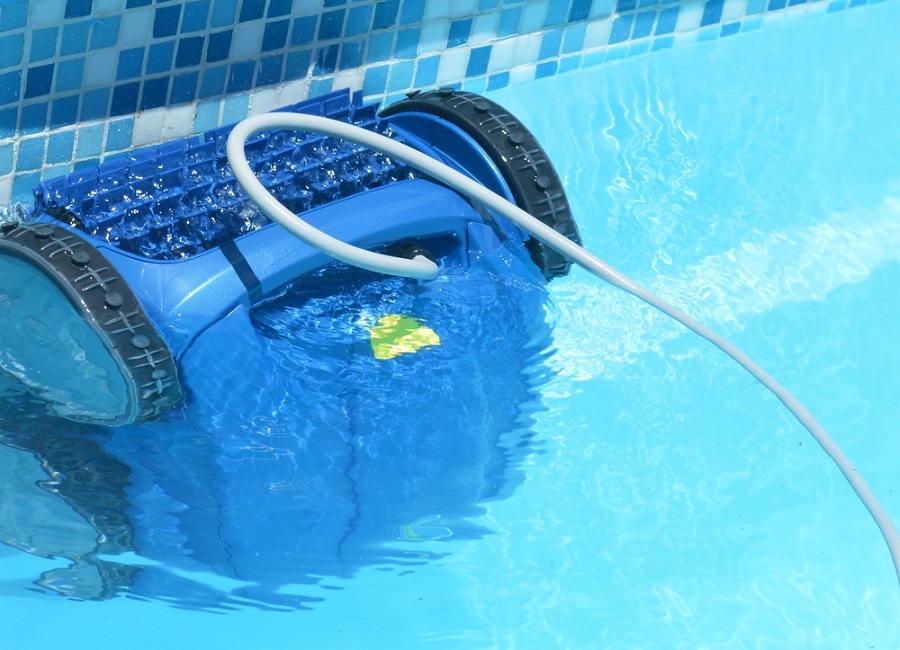
Most automatic pool cleaners are designed to be hands-free. They do come with an instruction manual, but by design most automatic pool cleaners are very simple to use.
All you have to do is plug it into your pool pump system or an electrical outlet, drop it into your pool, turn it on, and let it run. Programmed schedules and intelligent navigation algorithms take care of the rest.
Once a week or so, you’ll need to empty the filters for most kinds of pool cleaners. But that’s about it.
2. They Save Time
This is the biggie for most pool owners.
When you’re busy with other household chores, it’s nice to save time. Automatic pool cleaners save you time because you don’t have to manually clean your pool.
3. They Are Eco Friendly
The best way to keep your pool clean is by using a pool vacuum. However, not all vacuums are created equal. Some vacuums work better than others for different reasons.
One of the biggest differences between vacuums is whether or not they use electricity and how much they consume.
Most vacuums require some type of power source.
If you want to conserve energy, then you’ll want to choose a vacuum that uses lower-voltage power (like robotic pool cleaners) or rely on your existing pool pump to function (like suction-side and pressure-side cleaners).
4. They Keep Your Pool Safe & Healthy

There are many dangers when swimming in a pool. These include drowning, bacteria, and chemical burns.
If you have an automatic pool cleaner, it will help prevent these problems from happening. The reason why is because it helps remove debris from the water.
5. Frees Your Time For More Important Tasks
You probably already know that maintaining your pool involves a lot of tasks – testing the water, adding chemicals, checking equipment, updating the schedules. It isn’t easy to stay on top of everything. And there are so many chemicals involved that it can get pretty complicated.
However, if you have an automatic pool vacuum, it makes it easier to maintain your pool. Instead of spending hours on manual labor you can spend your limited time managing your pool – trying to figure out what chemicals to add and how much to add them, just set your pool cleaner to automatically clean your pool.
6. Cost-Effective
A pool cleaner typically costs $100 to $1,000 – which may seem like an expensive investment at first glance.
However, after you start using your automatic pool cleaner, you’ll see that it saves you money over time. Because you don’t need to hire a pool guy, for example. And you won’t consume as many chemicals when your pool is kept free of debris.
7. Better Than Manual Vacuums
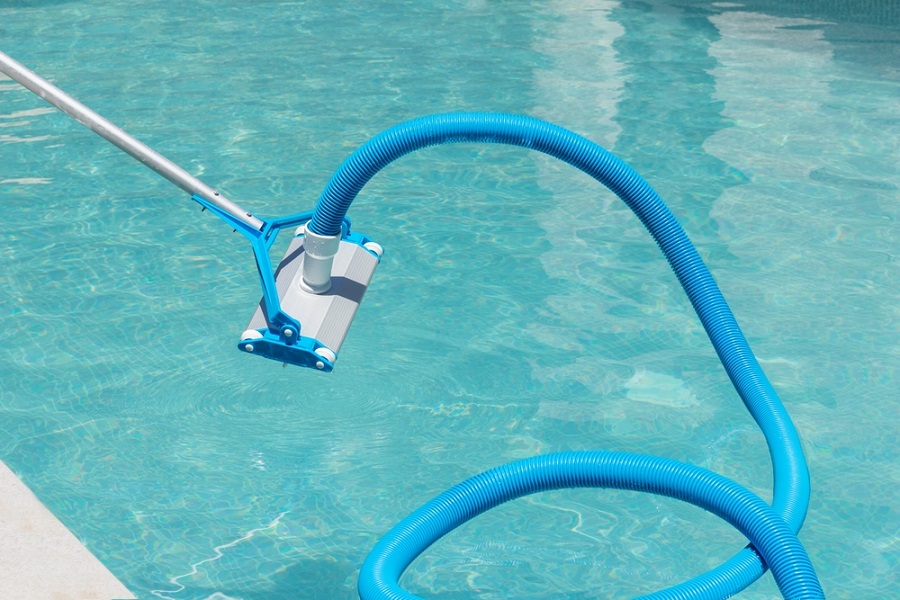
Manual pool vacuums aren’t as effective as automatic pool cleaners for several reasons.
Generally speaking, the biggest reason has already been mentioned: most people can’t stick to a schedule when it comes to cleaning their pool.
Automatic Pool Cleaners: Cons
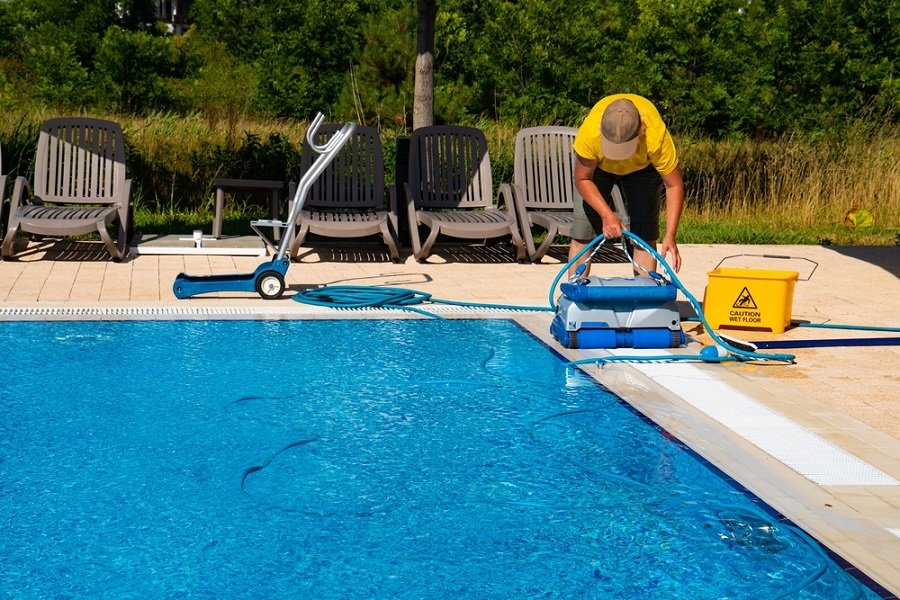
1. They Don't Work Well On Complex Surfaces or Very Deep Pools
Deeper pools (15 feet or more) require special equipment to clean properly. Most automatic pool cleaners aren’t designed to clean deep pools.
In addition, if your pool is custom-designed with lots of seating areas, curved surfaces, sunbathing platforms, and bar stools, be aware that automatic pool cleaners in general can only clean flat and smoothly rounded pool surfaces.
This means you’re left cleaning everything else by hand.
2. Some Models Are Expensive
Some automatic pool cleaners designed to clean large inground pools can cost more than $1500.
If you want to buy a model that has features that you may not need, then you may end up spending a lot of money.
3. They Break
Automatic pool cleaners are amazing devices designed for everyday use, but they are complex. Wheels fail, jet drives fail, electrical power supplies fail, motors sometimes fail.
Fixing them is usually easy and inexpensive. But getting parts for a rare or popular new model can be difficult.
This is why we prefer to recommend only proven high-volume production models to our customers and readers.
4. They Can Damage Your Pool Pump
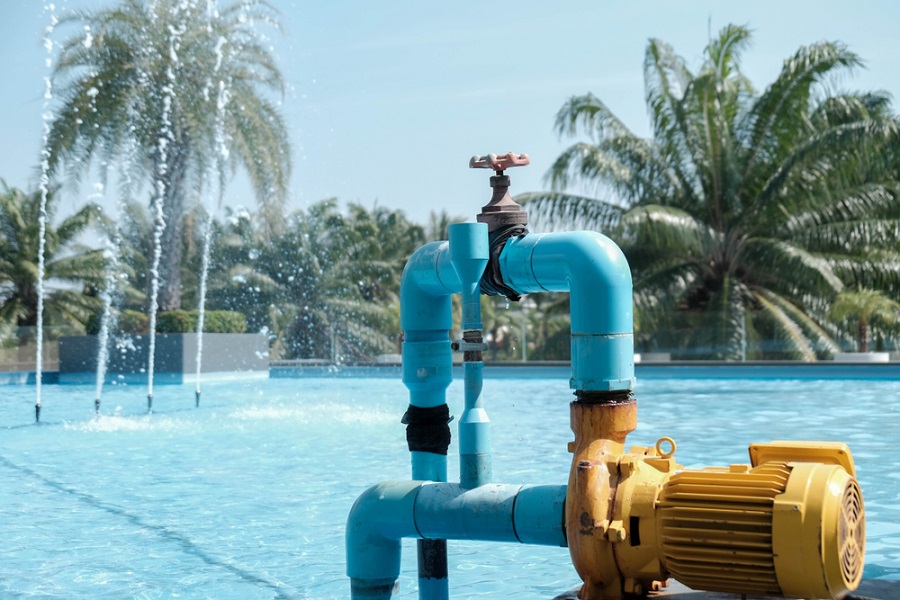
While some automatic pool cleaners are made specifically for pool pumps, others are not. If you have a pool pump that isn’t compatible with your automatic pool cleaner, then you could damage your pump.
5. They Aren't 100% Effective
Even though automatic pool cleaners are supposed to automatically clean your pool, they often miss spots. You will always have a few places they can’t reach.
6. Cordless Units Often Run Out Of Battery Power
Cordless/battery-powered pool cleaners have a limited range that most people will not find satisfactory. The technology is almost there for larger pools – but buyer beware.
7. They Require Inspection and Maintance
Regular maintenance is required to keep your automatic pool cleaner working well. Mostly, this involves inspecting key moving parts and replacing before they fail. Again, easy and cheap to do. But you need to inspect or failure could result in a complete replacement.
So which automatic pool cleaner is right for you? That depends on what kind of pool cleaner you want.
There are many types of automatic pool cleaners available today. Here are just a few of the most popular ones.
Types of Automatic Pool Cleaners
1. Pressure Side Pool Cleaners
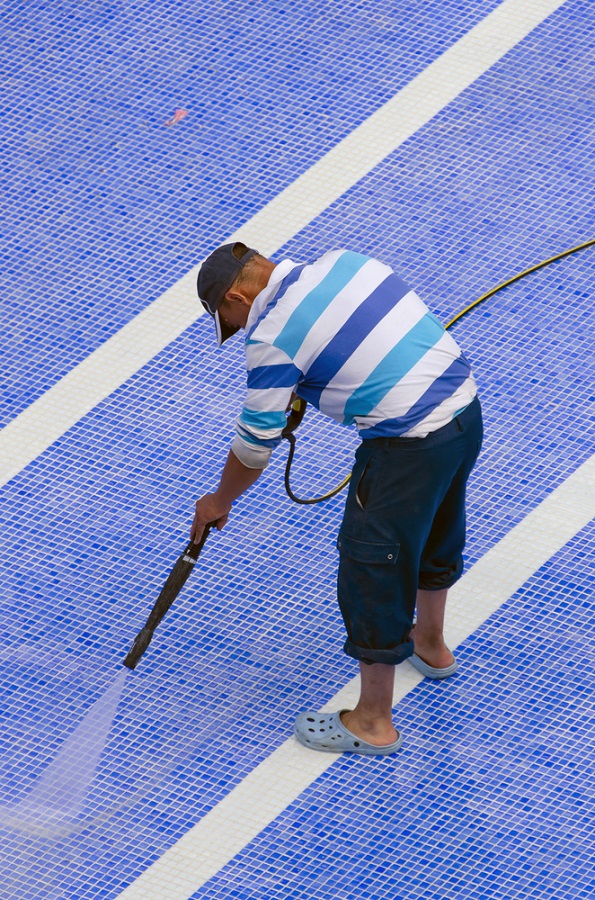
This is the most common type of automatic pool cleaner.
Pressure-side pool cleaners are purely mechanical devices that rely on the return line (clean water) side of your pool filtration system to power water jets that move them around and vacuum debris from the surface of your pool, which they trap in an onboard filter.
The most popular brand of pressure-side automatic pool cleaner is Polaris.
Pros
- 1. Easy to use.
- 2. Simple mechanical design. No electrical system or motors to worry about.
- 3. Low price.
- 4. Can be used with any size or shape pool.
- 5. Works better than manual vacuum cleaners.
Cons
- 1. Not very effective wit.h all sizes of debris
- 2. Movement is random, not intelligent. So some spots get overlooked.
- 3. Places additional strain on pool pump.
- 4. Larger units require addition of a second pump.
2. Suction Side Pool Cleaners
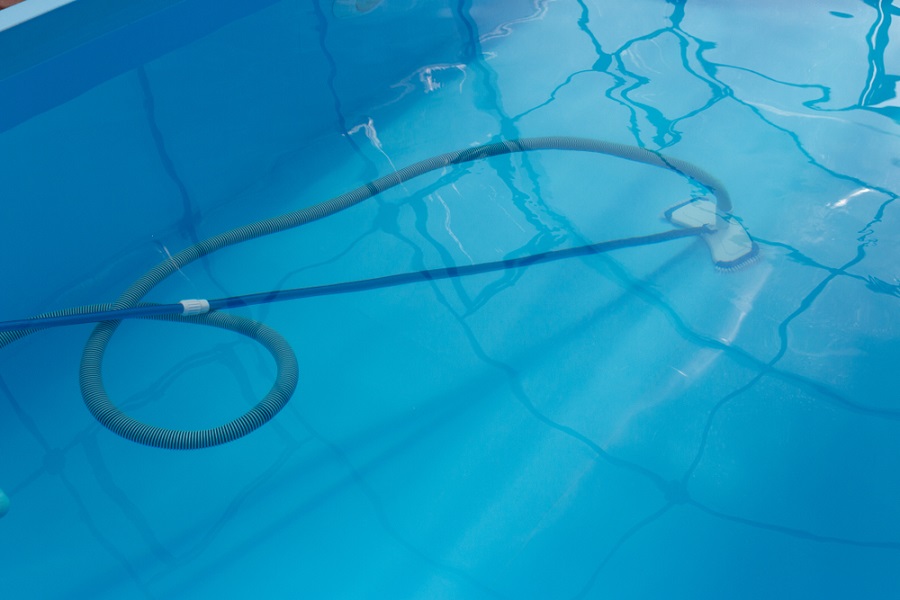
This type of automatic pool cleaner uses a hose connected to your pool’s skimmer return line (dirty water side) to vacuum dirty pool water and debris directly into your pool filter for cleaning.
As the water passes through the filter system, the suction created by the vacuum motor sucks up all the debris.
Pros
- 1. Large suction capacity.
- 2. Extremely simple device - just a long hose w/ a brush vacuum head.
- 3. Suitable for deep pools.
- 4. Easier to maintain than pressure-side pool cleaners.
- 5. Less expensive than other types of pool cleaners.
- 6. Can handle large amounts of debris and all sizes of debris.
Cons
- 1. Not automatic. All cleaning is done by hand, like a floor vacuum.
- 2. Pushes all debris into your pool filter, so it will require more frequent cleaning.
- 3. Takes longer to clean a pool than a pressure-side pool cleaner.
3. Robotic Pool Cleaners
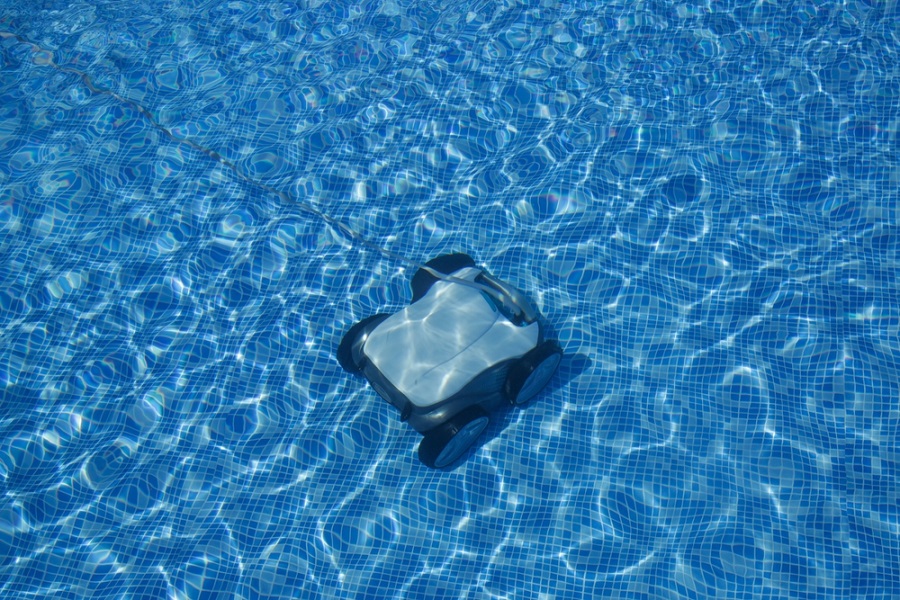
Robotic Pool Cleaners are fully autonomous electrical-mechanical vacuums that roam the bottom of your pool, scrubbing and sucking debris into an onboard filter basket or cartridge. They plug into a standard 110V outlet but run on 12V DC power, so they consume very little electricity.
Most come with intelligent navigation systems that map the bottom of your pool and remember where they’ve been, so total cleaning time is minimized.
Pros
- 1. Easy to use.
- 2. Quickest way to clean a large pool.
- 3. Can be programmed and scheduled to run when you want.
- 4. Choice of filter media means all sizes of debris can be dealt with.
- 5. Can clean walls, stairs, and curved surfaces far better than other types.
Cons
- 1. More complex, so failure & repairs are more costly.
- 2. Some models do not work as advertised. Do your research.
- 3. Expensive to purchase.
FAQs
Q: How often should I clean my pool?
It depends on how dirty your pool is. You will want to clean it once every week during the summer months. In winter, you may only have to clean it once every two weeks. If you notice a lot of leaves floating in the pool, you might want to clean it more frequently.
Q: Is it safe to leave my kids unattended with an automatic pool cleaner in the pool?
In general, yes. Automatic pool cleaners are designed to prevent people from getting tangled in lines.
Q: How long does it take to clean my pool using an automatic pool cleaner?
The time required to clean a pool varies depending on the size and condition of your pool. A typical automatic pool cleaner takes approximately 30 minutes to 2 hours thoroughly clean a 25,000-gallon pool.
Q: Are automatic pool cleaners noisy?
Most automatic pool cleaners are very quiet because they run underneath the water. Some models even have a whisper mode so you don’t disturb anyone else in the house.
Q: Will my pool get damaged if I use an automatic pool cleaner?
A: No, this is actually very rare today. Today’s automatic pool cleaners use soft materials and water jets to minimize damage to pool surfaces. That said, some older models relied on harder plastics and metal parts which were known to damage vinyl liners and scratch surfaces.

